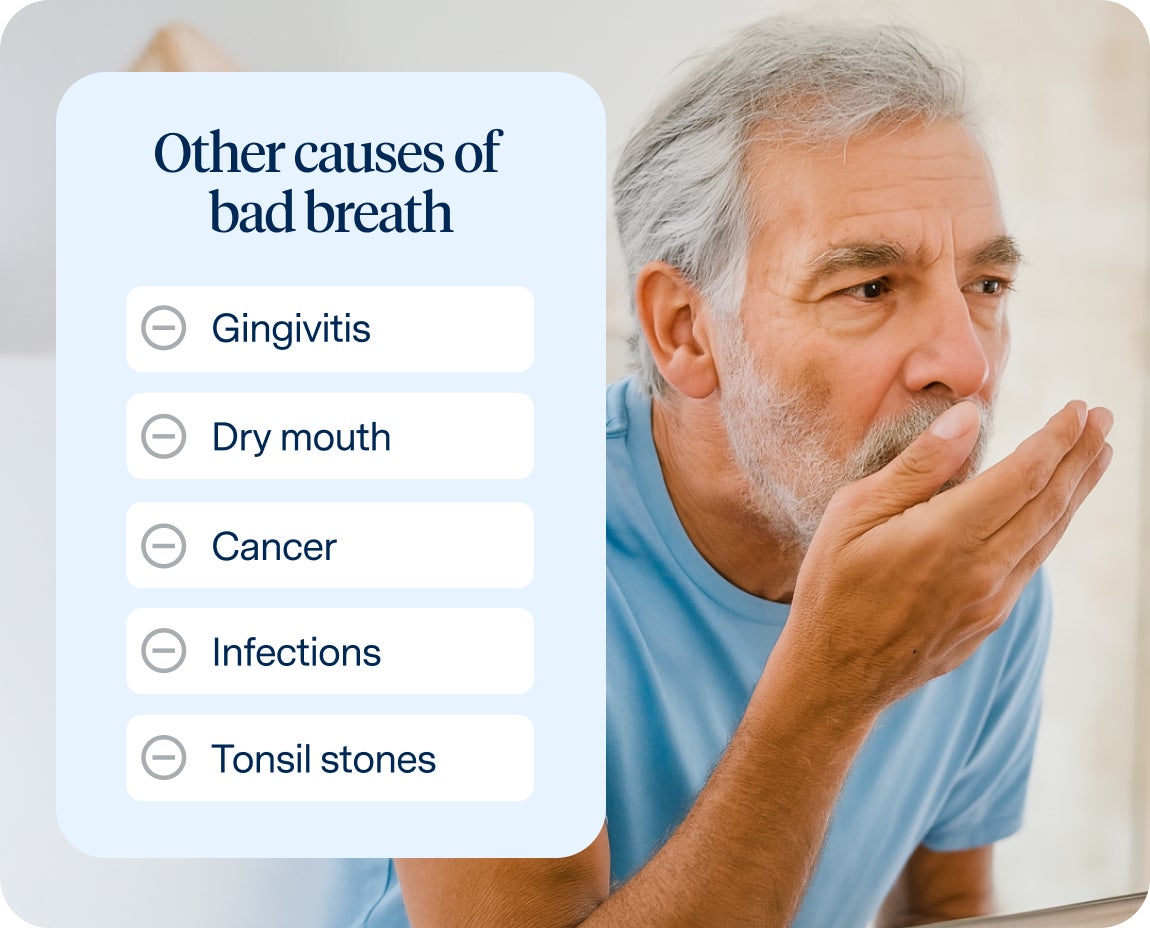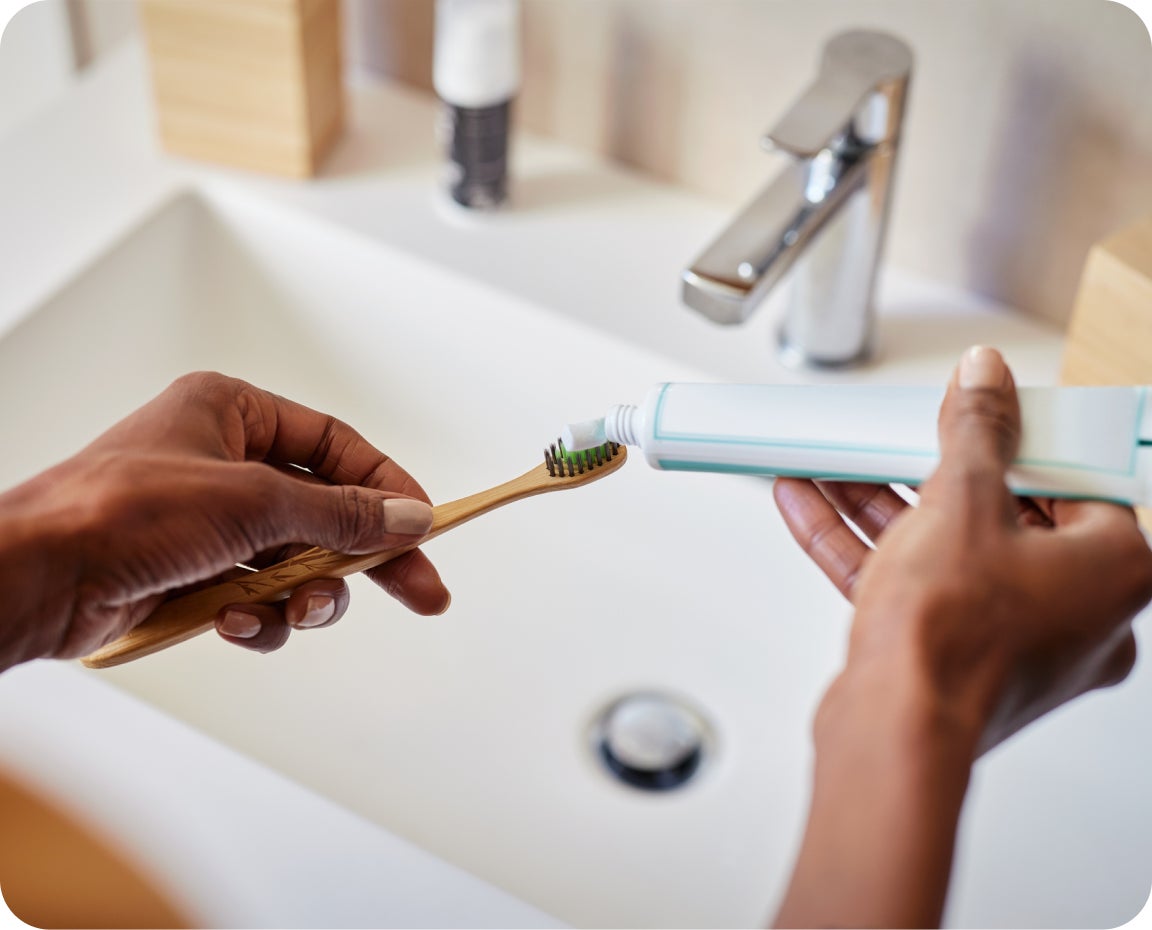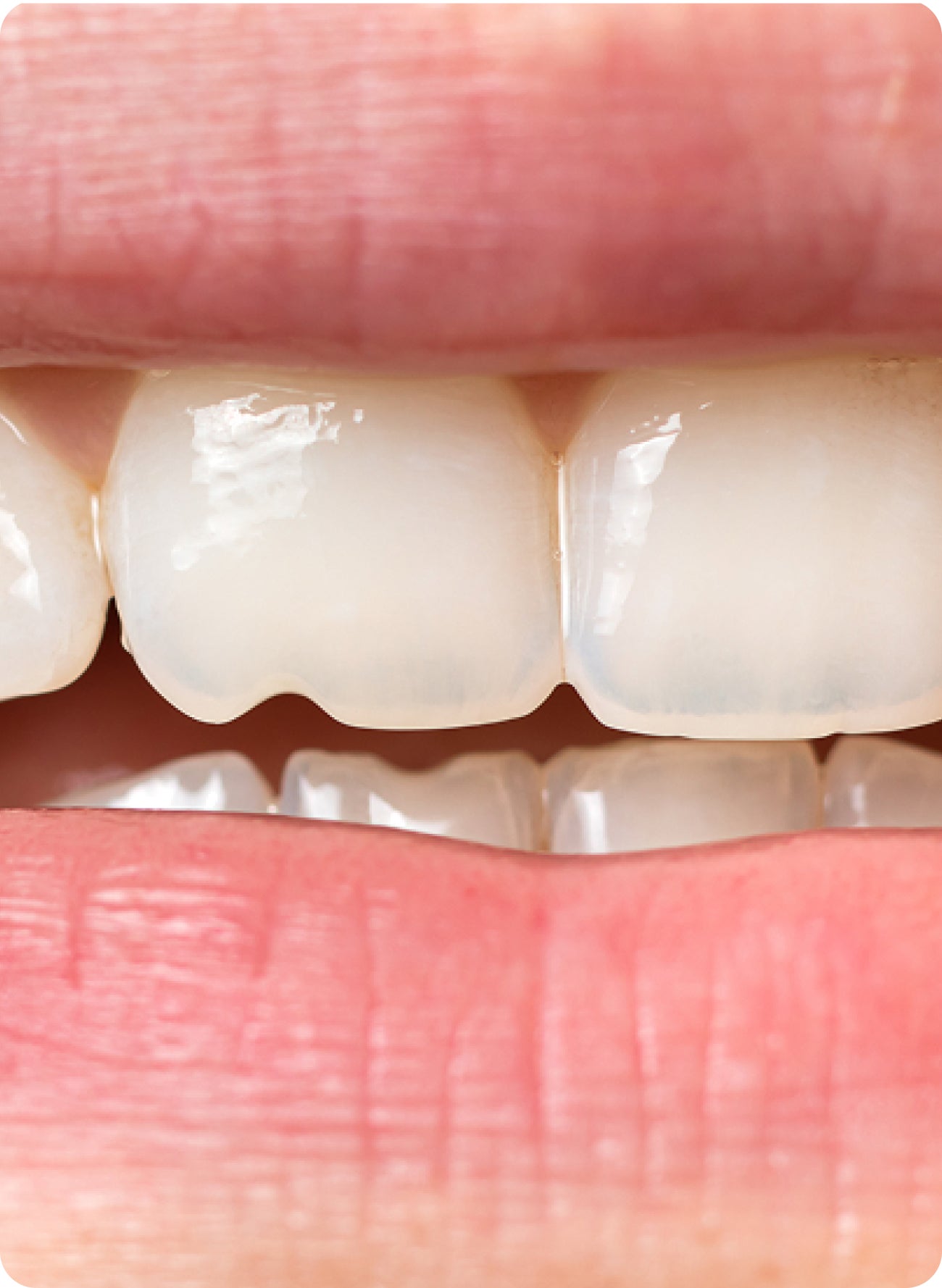Last updated 07.11.2025
Bad breath: causes and treatment
This article discusses the causes of bad breath and how to treat it with good oral hygiene and professional dental care.

Bad breath happens to everyone from time to time. Whether it’s morning breath or something lingering after a meal, it’s completely normal. However, if bad breath sticks around, it could point to an oral health issue or another underlying condition.
The good news is that improving your oral hygiene can help. If the problem persists, it’s time for a visit to the dentist to find the cause and explore treatment options. If you’re experiencing persistent bad breath, schedule an appointment with your Aspen Dental care team today.
What is halitosis (bad breath)?
Halitosis, or bad breath, happens when bacteria build up in the mouth. While regular brushing, flossing and mouthwash can help, chronic bad breath often needs more attention. If it doesn’t improve with your usual oral care routine, it might be a sign of a bigger health issue. In that case, it’s a good idea to visit your dentist at Aspen Dental for advice and treatment.
What is the most common cause of halitosis?
The most common cause of chronic bad breath is usually poor oral hygiene. When you don’t brush, floss or follow good oral hygiene habits, bacteria build up in your mouth. This can lead to issues like:
Chronic bad breath
Other causes of bad breath
There are several reasons why bad breath can persist over time. Here are some common causes:

Gingivitis
Gum infections like gingivitis or periodontal disease often result from a buildup of plaque and bacteria. These infections can cause swollen, red and bleeding gums, and over time, lead to gum recession. This exposes the roots of teeth and creates pockets where bacteria can gather.
Dry mouth
Saliva plays an important role in keeping your mouth clean by washing away food particles and bacteria. If you have a dry mouth, there may not be enough saliva to clear out the bacteria that cause bad breath, leaving a bad smell that sticks around.
Cancer
Some cancers have been linked to bad breath as a symptom. Additionally, cancer treatments like chemotherapy, especially for oral cancers, can lead to dry mouth, which can make bad breath worse.
Infections
Infections, whether in the mouth or elsewhere, can lead to bad breath. Respiratory and sinus infections, such as bronchitis or sinusitis, often cause mucus buildup in the nasal and sinus cavities. This mucus can linger in the throat, creating an ideal environment for bacteria to grow, resulting in bad breath.
Tonsil stones
Tonsil stones, also known as tonsilloliths, are small, hard deposits made of trapped food particles, bacteria and other debris. These stones can get lodged in pockets in the tonsils and, while harmless, they are a common culprit of persistent bad breath.
How to get rid of bad breath
Bad breath is often caused by poor oral hygiene and bacteria build-up, so improving your daily dental care routine is a great place to start. Dentists recommend brushing your teeth twice a day and flossing once a day to remove food particles and stop bacteria from building up on your teeth, gums, and tongue.
Using a tongue scraper can also help by clearing away bacteria from your tongue. An antibacterial or fluoride mouthwash is another great option to kill germs and reduce plaque.
Don’t forget to schedule a visit at your local Aspen Dental office twice a year for professional cleanings and preventative services. If bad breath continues to be an issue, schedule an appointment today to find the underlying cause and create a treatment plan to help.

How to prevent halitosis
Keeping your breath fresh and maintaining good oral hygiene doesn’t have to be complicated. Here are some simple tips to help:
Brush and floss daily: Brush twice a day and floss once a day to remove food particles, bacteria and plaque.
Clean your tongue: Use a tongue scraper or the back of your toothbrush to remove the coating that can build up on your tongue.
Visit your dentist regularly: Schedule a professional dental cleaning twice a year and discuss any concerns with your dentist to catch potential issues early.
Use mouthwash: An antibacterial mouthwash can freshen your breath and remove the bacteria and debris that cause bad odors.
Stay hydrated: Drinking water helps promote saliva production, which naturally cleans your teeth, gums and tongue.
Quit tobacco: Smoking contributes to dry mouth and increases bacteria, both of which can lead to bad breath.
Check your diet: Sugary and acidic foods can encourage bacteria growth and unpleasant odors, so try to limit them when you can.
Bad breath FAQs
Can bad breath be cured permanently?
Keeping your breath fresh starts with healthy dental habits. In most cases, good oral hygiene can manage bad breath, especially if it’s caused by bacteria build-up.
When should I see a dentist for bad breath?
If bad breath doesn’t go away or comes with other symptoms like swollen gums or dry mouth, it could be a sign of something more serious. Your Aspen Dental care team can help figure out the cause and provide the right treatment or give you a referral to a specialist.
What does it mean if you have constant bad breath?
Persistent bad breath might signal an underlying issue, such as gum disease or an infection. If it sticks around, it’s a good idea to visit your dentist to get to the bottom of it.
Will bad breath go away on its own?
Temporary bad breath, like after a strong-smelling meal or in the morning, usually goes away on its own, especially after brushing. But if it’s caused by bacteria or other health issues, it might get worse without treatment.
Get rid of your bad breath
Bad breath can be embarrassing and sometimes a sign of an oral health issue that needs attention. Don’t let it hold you back—schedule an appointment at your local Aspen Dental to get to the root of the problem.



